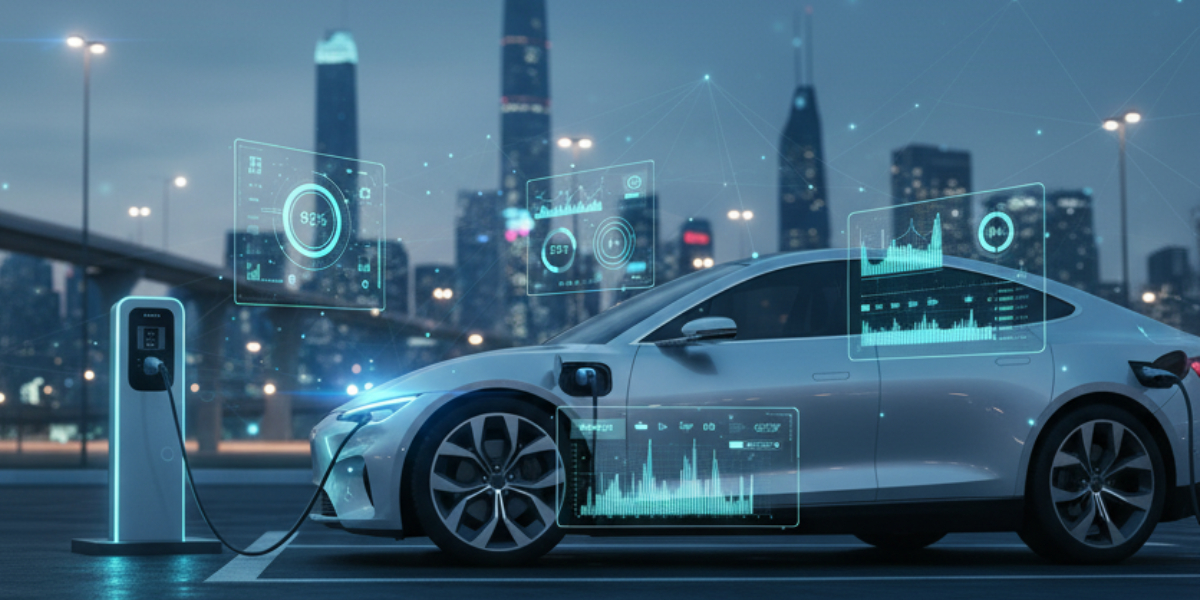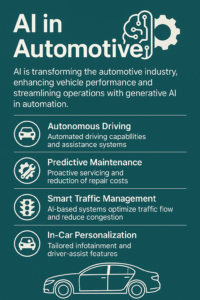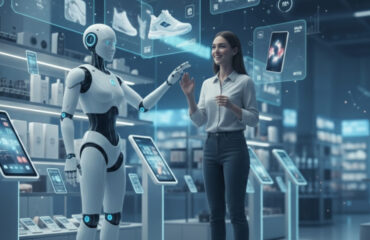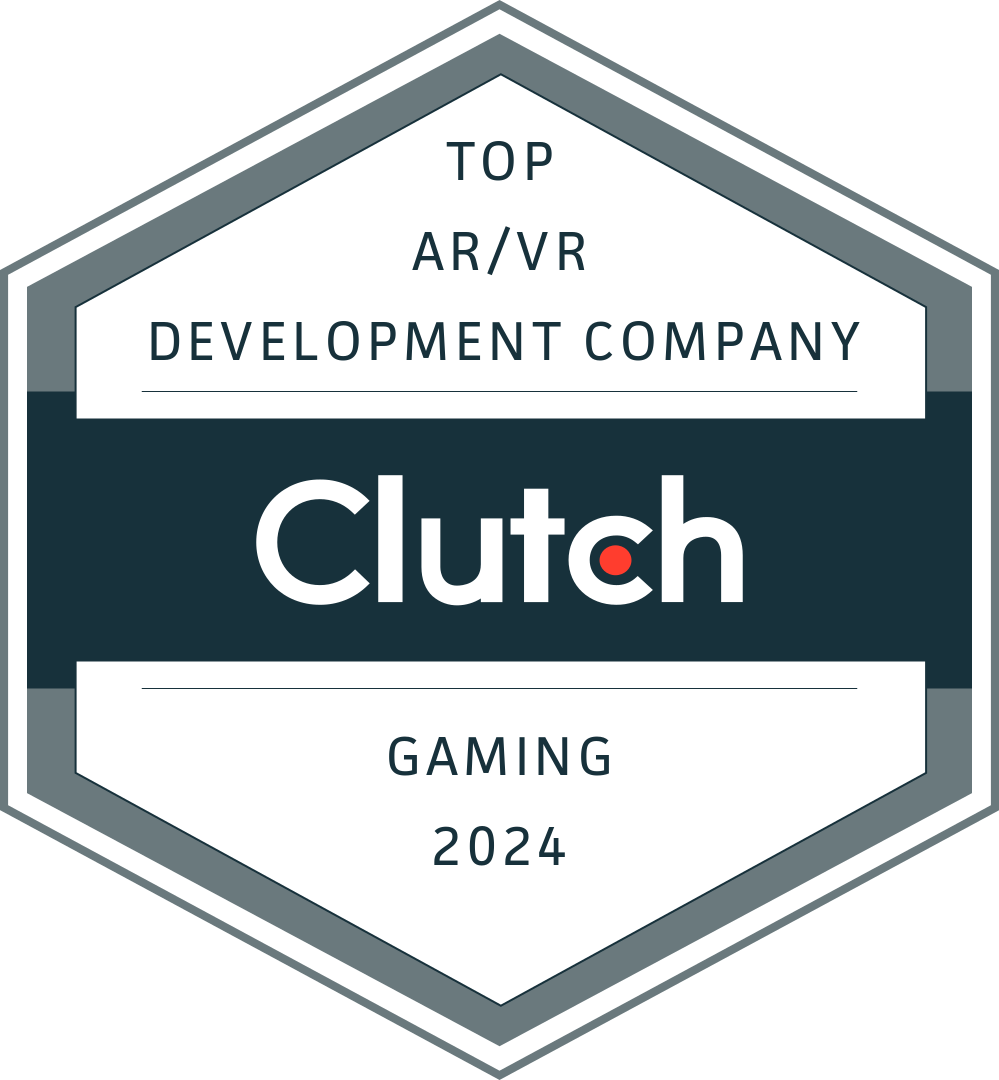
Just like every other industry, the automotive market is experiencing a boom in AI-powered vehicles. From understanding the possibilities of automated driving to predictive maintenance, what was once science fiction may soon become a reality. Not only is vehicle performance improved, but even operations are streamlined with the support of generative AI in automation. With its help, we are reimagining how vehicles are built and sold, demonstrating not simply technical but financial benefits.
Discover this and much more in this article, only with Red Apple Technologies!
What Is AI in Automotive?
It refers to the implementation of advanced machine learning and computer vision in the customer experience of the product, as well as vehicle design and manufacturing, and industry operations.
With AI in play, vehicles will be smarter and more efficient. The automotive industry is using it to improve safety features and the overall driving experience. Expect better driving assistance systems and personalized in-car experiences. Our roads will be safer, and our interaction with our vehicles will be shaped in unprecedented ways.
The Shift of Automotive Toward AI
The best way to understand AI applications in automotive industry is to observe the real-world transformations happening within. As connected vehicles and smart infrastructure become mainstream, the future of AI in the automotive industry begins to unfold with unmistakable clarity. AI-based navigation systems are optimizing routes in real-time, saving fuel and time. Similarly, driver monitoring systems powered by computer vision react to signs of drowsiness or distraction, making journeys significantly safer.
Manufacturers are developing AI-based automotive solutions that go beyond convenience; predictive maintenance uses continual data analysis to foresee vehicle issues before they result in breakdowns. This not only enhances reliability but also reduces ownership costs, illustrating the true benefits of AI in the automotive industry.
Key AI Applications in the Transportation Sector
Autonomous Driving:While fully autonomous cars are not yet common, partial automation like lane-keeping assistance and adaptive cruise control is already revolutionizing daily commutes.
Smart Traffic Management:AI-based traffic systems analyze citywide data, easing congestion and making urban mobility more efficient.
Predictive Maintenance:Leveraging AI, predictive analytics ensures timely servicing, prolonging vehicle life, and lowering unexpected repair costs.
Fleet Management:AI in transportation is indispensable for logistics, aoptimizing routes, schedules, and fuel management, which translates to reduced costs and higher customer satisfaction.
In-Car Personalization:AI delivers tailored infotainment, climate control, and driver-assist features, providing highly personalized driving experiences.
These applications demonstrate why businesses often seek out an expert AI app development company when implementing modern automotive solutions. Whether enhancing vehicle features or back-end fleet operations, working with specialists helps maximize ROI and speed to market.

Key AI Use Cases in Automation and Transportation
Let’s look at the benefits of AI in automotive industry before moving on to the global industry giants who are leveraging the advantages this new technology has to offer.
Generative Design & Simulation: AI tools enable engineers to rapidly create and test numerous part designs virtually, thereby reducing costs and defects. Digital twins enable virtual testing and product validation before physical prototypes are produced, streamlining design cycles.
Smart In-Vehicle Infotainment: Modern systems use AI for natural language voice assistants, personalized entertainment, mood detection, and real-time recommendations, enhancing the driving experience.
Predictive Maintenance:ML models analyze sensor data to forecast part failures, minimizing downtime and optimizing service schedules for both manufacturers and fleet operators.
Driver Assistance & Autonomous Features:Advanced driver-assistance systems (ADAS), including lane-keeping, adaptive cruise control, and collision avoidance, leverage AI and computer vision and make roads safer.
Real-Time Traffic and Route Optimization: AI analyzes live traffic flows to suggest optimal routes and reduce delays, as used by logistics fleet operators.
Supply Chain & Production Automation:Robots powered by computer vision and AI perform precision assembly, while AI predicts product demand and optimizes production planning and inventory management.
Fleet Management: AI analyzes vehicle, driver, and traffic data to optimize routes, fuel consumption, and fleet operations, delivering significant cost savings.
AI Transforming Automotive Operations
Generative AI and data-driven insights are not just limited to vehicles themselves; automotive manufacturers are adopting AI to streamline their operations. From design simulations to optimizing parts inventory and production lines, AI supports smarter manufacturing. Digital twins, for instance, create virtual replicas of factories for real-time monitoring and improvement suggestions, helping companies future-proof their processes.
Moreover, sales and after-sales experiences are being enhanced by AI-powered chatbots, virtual assistants, and recommendation engines, allowing customers to make more informed purchasing decisions. Companies can now hire app developers to create next-gen mobility and after-market solutions for both end-users and businesses.
Examples of Global Brands Leveraging AI
| Brands | AI Use Cases & Example |
|---|---|
| BMW | Use 400+ AI applications for generative design, data analytics, and manufacturing quality. |
| Ford | Invested over $1 billion in self-driving technology and uses generative AI in quality assurance, supply chain, and inventory management. |
| Mercedes-Benz | Integrates ChatGPT into 900,000+ vehicles for advanced in-car assistants. |
| Toyota | Uses generative AI for EV design, voice agents, and predictive taxi dispatch; Safety Connect services for collision detection. |
| General Motors | AI for connected commerce hubs, autonomous vehicle R&D, and design optimization. |
| Nissan | Generative AI for rapid R&D cycles shortening, improving model launches. |
| Daimler AG | AI-powered driver assistance, autonomous driving, and electric vehicle development. |
| Valeo | DRIVE4U Sensors for urban autonomous driving, and electric vehicle development. |
| Bosch | AI-based driver assistance and advanced safety & connectivity solutions. |
| CarMax | Uses GPT models to automate used vehicle inventory listing descriptions and marketing. |
| Scania | AI-driven fuel optimization in fleet operations. |
| Alphabet (Sidewalk Labs) | AI-powered urban traffic management with sensor fusion and real-time analysis. |
Red Apple Technologies: Your Partner in AI-Powered Automotive
We are uniquely positioned to help you realize the future of AI in automotive industry; automotive and transportation companies can harness the power of AI for innovation, efficiency, and competitive advantage. With over a decade of experience in app development and advanced technology solutions, we deliver tailored AI-powered applications that address real-world challenges in the automotive sector.
How We Can Help
Custom AI Solutions: With us, you can tap into specialist services, including developing custom AI applications for automotive clients, including safety systems, predictive maintenance platforms, and smart infotainment solutions. These apps are designed to enhance customer safety, streamline operations, and improve the overall driving experience.
End-to-End Development:From concept to deployment, we offer comprehensive services, including AI strategy, app design, development, testing, and ongoing support. The company’s agile-driven team ensures projects are delivered on time and meet the highest quality standards.
Advanced Technology Stack:Leveraging cutting-edge frameworks like React Native, Node.js, Flutter, Unity, and more, we build scalable, future-ready solutions that integrate seamlessly with existing automotive systems.
Industry Expertise: With a proven track record of serving over 100 clients and executing 500+ projects, we bring deep industry knowledge and technical proficiency to every engagement. The company’s expertise spans AI, IoT, AR/VR, blockchain, and more, enabling holistic digital transformation for automotive businesses.
Conclusion
We are not going driver-less with AI (not yet anyway), but we are looking at the near future where vehicles will include multiple AI features that make transportation of today look frail in comparison.
The benefits of AI in the automotive industry are numerous, ranging from enhanced safety and predictive maintenance to smart traffic solutions and new revenue opportunities across the transportation sector. With constant advancements, the future of AI in the automotive industry promises safer roads, smarter vehicles, and unprecedented efficiencies.
For organizations ready to capitalize on these opportunities, partnering with an experienced app development company is the proven way forward. To turn innovative concepts into road-ready solutions, don’t hesitate to bring in app developers to the game. Developers at Red Apple Technologies are equipped with knowledge of the latest AI applications in the transportation sector. We are here to help you navigate this transportation, leading the charge in delivering reliable, scalable AI-powered automotive solutions.
To Have A Better Understanding On This Let us Answer The Following Questions
Answer: Edge AI processes sensor data directly within the vehicle (rather than sending it to the cloud), enabling real-time functions, such as:
- Critical safety features (e.g., automatic emergency braking and accident avoidance).
- Advanced driver assistance systems (ADAS) that react without network delays, improving both safety and user experience.
Answer: AI improves safety in multiple ways:
- Monitoring for driver drowsiness and distraction using sensors and facial recognition.
- Detecting obstacles, pedestrians, and other vehicles to support collision avoidance.
- Optimizing braking and steering responses in complex road conditions.
Answer: Yes, AI-driven analytics optimize inventory, predict damaged surges, and streamline procurement processes. This results in a more resilient, efficient, and cost-effective automotive supply chain, minimizing production delays and reducing operational costs.
Answer: Concerns include:
- Determining liability for autonomous vehicle incidents.
- Privacy and data protection for users’ driving and location information.
- Transparency and fairness in how AI systems make decisions.
Answer: Dealerships use AI for chatbots, personalized service recommendations, appointment booking automation, and lead management, streamlining the customer journey both online and offline.





























 Book an Appointment
Book an Appointment Get Instant Project Estimation
Get Instant Project Estimation WhatsApp Now
WhatsApp Now






 Book An Appointment
Book An Appointment WhatsApp
WhatsApp







